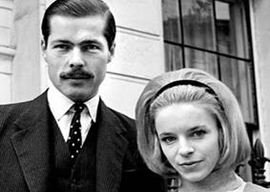
February 15, 2018

Lord and Lady Lucan
Source: Wikimedia Commons
A Moment in Time reminded me of English women expatriates I had met in the South of France more than fifty years ago. They were very proud of being British, never tired of telling us they were British, were rather broke, and talked down to average people. They spoke about Colonel so-and-so, or Lord and Lady so-and-so, some of whom were distantly related to them, or perhaps were just acquaintances. It also reminded me of characters in Separate Tables, Terence Rattigan’s brilliant play about snobby souls living out their rather desperate lives in a grubby seaside hotel back in the ’50s. Except that poor old now-dead-by-her-own-hand Veronica Lucan does not in any way or form write like the great Sir Terence. She goes into detail about her everyday disasters in a very tiresome, methodical manner, like a benevolent Eichmann, listing all the bad things that have happened to her, and I must admit there have been many.
She began life by being rather plain and having a rather beautiful sister, Christina Shand Kydd, wife of Bill Shand Kydd, a hero of mine for his death-defying courage while on a horse, and for his bravery once reduced to being unable to move anything except his eyes following a riding accident. Veronica Lucan is not nice about her sister or her brother-in-law. The reason she gives is that the Shand-Kydds alienated her three children, who chose to live with them after their father, the infamous 7th Earl of Lucan, had mistakenly murdered their nanny, Sandra Rivett, instead of their mother.
Needless to say, Veronica Lucan’s theory of blaming the Shand Kydds for alienating her children did not have many adherents, if any, except for herself. Brought up middle-class with regular army officers as grandfather and father, she begins her opus by listing the aristocratic connections and history of the man she married, a strange way of listing one’s life. She goes tiresomely on with teddies and dolls and their various names, until we finally get to the meat of the story. Which turns out to be how horrid life with Lucky Lucan was, rather than the murder. In this she is correct, because much too much has been written about that accidental killing of an innocent nanny, whom a drunken Lucan mistook for his wife and bludgeoned to death.
After a detailed account of the night of the murder, she sums up her complaints about various doctors, judges, and relations, as well as her three children, who have chosen to live with their aunt or by themselves, away from her. She does it like an accountant listing one’s debts, without using adjectives. For example: “I think I have shown that my son decided he wanted to live as part of another family.” Proper middle-class anal retention to the last. Now here comes me, the reviewer:
Three days before Nov. 7, 1974, I was packing to fly to Athens when Lucky Lucan dropped in. I had known Lucky—he was given that name by John Aspinall for being so unlucky in games of chance—since 1962, when we met during the Cowes powerboat race. I was crewing on Agnelli’s boat when a cartoonlike mustachioed Englishman put-putted by and greeted us by saying, “See you in Tor—blub blub…” and sank right in front of us. We pulled him on board and he introduced himself as John Bingham. That evening, at a Max Aitken bash for drivers and crews, I began a long friendship with the future 7th Earl of Lucan. Lucan became a close friend—in fact, so much so that when I came back from Vietnam the second time, I brought back a jade ring for Veronica, a Greek custom. (One gifted the wife, not the man.) She used to stick her ringed finger in my face and go zzzzz.
Lucky may have looked like a cartoon character of an Englishman, but he knew his history. He lamented the loss of empire and predicted that England was going to hell. But always with a wintry smile and always with humor. When the marriage began to go bad, he told me how Veronica was able to sound perfectly normal when in court while he was trying to get custody of the kids, as she was “obviously crazy, and I’m very worried that she might harm the children.” That Veronica was strange was obvious. According to Lucky she got worse following the birth of each child, and there were three. In her book Veronica lists the countless pills she was on: sleeping pills, uppers, downers, you name it.